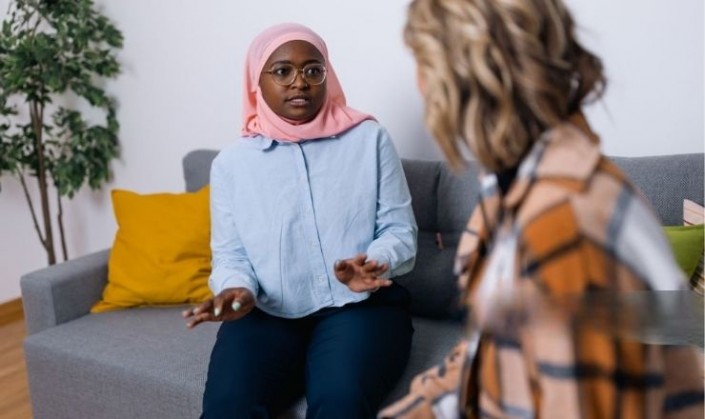
by Umma Miah
There is a growing body of evidence on Muslim communities
compared to other faith-based communities having lower recovery rates when
accessing mainstream counselling. While it makes for grim reading, the positive
spin can be that it lends more support for integrative forms of therapy.
At Muslim
Women’s Network (MWNUK), we understand the benefits of having a specialist
counselling service that is sensitive to a person’s faith and culture. More
importantly, we are aware of the stigma Muslim women can experience when
seeking support. We recognised from our pilot of the counselling service in 2016, the value in having counsellors
from diverse backgrounds; who use spiritual,
physical and psychological approaches to sensitively understand the
multiplicity of issues Muslim women face.
“The counsellor was brilliant, she was empathetic and really understood my background and issues. I am so glad I was able to get counselling via MWN. I have recommended them to family and friends.” (a client battling depression)
Since our faith and culturally sensitive
counselling service began in 2016, we have seen considerable growth in
referrals. In the last seven years, there has been an average yearly growth of
37% referrals made through MWN helpline to the counselling service[1]. Muslim women are calling
the helpline presenting complex mental health issues. To mention a few:
post-traumatic stress disorder, post-natal depression, generational trauma,
identity crisis, sexual abuse, self-harm among others. We have also received increased referrals
from external agencies supporting Muslim women, as their services are limited
to adequately meet the diverse needs.
Compared to NHS talking therapies our waiting times are shorter and completion of therapy sessions is higher. Over the same period of 2021-2022, only 2.6% of Muslims referred to NHS Talking therapies finished their course of treatment, whilst for those accessing MWN counselling service it was reported to be 16%[2]. In 2023, 43% of women who started counselling with MWN scored ‘severe’ for anxiety and depression[3]. After completing counselling, 97% reported low scores for anxiety and depression.[4] .
Relatively, of those accessing the helpline and counselling services, 604 have reported improved mental health and 160 identified as at crisis point were prevented from self-harming and suicidal ideation[5].
"I found the counselling service faith and culturally sensitive and the counsellor was non-judgemental and provided a safe space for me to offload."(client struggling with anxiety)
Although, there is growing support for faith and
culturally sensitive counselling, this has not prospered to sustainable funding
for such beneficial services. Because of this, we have at times had to close
the counselling service for a short interim to prevent putting strain on the
service and our counsellors. Aside from the funding challenges, we at MWN are
committed to ensuring this service continues to thrive.
If there is anything on your mind that you want
support with, know that you can talk and share in confidence. We will from 3rd
June 2024 be reopening registration for our counselling service. Reach out to
the MWN helpline for further advice.
For the time being, here’s a short video from our
counsellor, Khudeja Sattar, on how to manage your
mental wellbeing in a holistic way.
[1] MWN counselling referral data (2016-2023)
[2] MWN counselling data (2021-2022)
[3] Patient Health Questionnaire (PHQ-9) and Generalised Anxiety Disorder
Join Our Movement
Raise your voice and get connected

 0
0